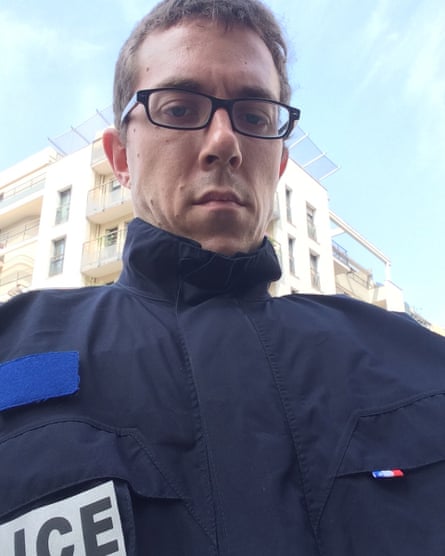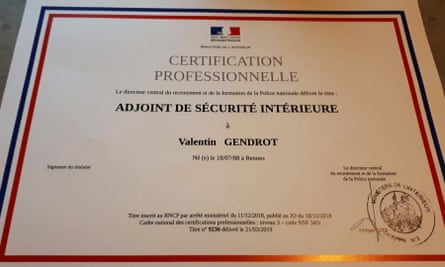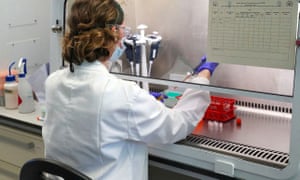vrijdag 4 september 2020
Antifa Activist Wanted In Connection to Portland Shooting Has Reportedly Been Killed By Police
French reporter who joined police exposes racism and violence
e
French reporter who joined police exposes racism and violence
 Valentin Gendrot spent almost six months as a police officer in a tough northern district of Paris. Photograph: Joel Saget/AFP/Getty Images
Valentin Gendrot spent almost six months as a police officer in a tough northern district of Paris. Photograph: Joel Saget/AFP/Getty Images

Man Linked to Killing at a Portland Protest Says He Acted in Self-Defense
Man Linked to Killing at a Portland Protest Says He Acted in Self-Defense
maandag 31 augustus 2020
Covid vaccine rush could make pandemic worse, say scientists
Covid vaccine rush could make pandemic worse, say scientists
Experts say strong evidence of efficacy needed to avoid approval of inferior vaccines
 A scientist at work at a Covid-19 vaccine laboratory in Oxford. Photograph: Reuters
A scientist at work at a Covid-19 vaccine laboratory in Oxford. Photograph: Reuters
The rush to immunise populations against Covid-19 could lead to the rollout of a vaccine that is not very effective and risk worsening the pandemic, leading scientists have said.
Politicians and commercial companies are competing to be the first to license a vaccine, but experts say the world would be better served by waiting until comprehensive results showed at least 30-50% effectiveness.
Ministers announced on Friday that the UK would take emergency powers to push any vaccine through the regulatory processes with unprecedented speed before the end of the year. Donald Trump wants to be able to announce the US has a vaccine before tthe presidential election on 3 November.
A vaccine is vital to stopping the pandemic, but Prof Sir Richard Peto of Oxford University and an adviser to the World Health Organization, said the first vaccine would be bought and used all over the world even if it had low efficacy.
Even if it protected only a minority of the population, it would be regarded as the standard by which later vaccines would be measured. That could even lead to inferior vaccines being approved, because they would not have to show that they were any better.
“I think there’s a big rush, a somewhat nationalistic rush and also somewhat capitalistic rush as well, to be absolutely first to register a vaccine, and it will actually make it more difficult to evaluate other vaccines,” Peto said.
“We do need a vaccine that works and we need it soon,” but “we really do need quite strong evidence of efficacy”.
There is huge political and commercial momentum in the UK behind the Oxford/AstraZeneca vaccine, which is ahead of most other contenders in the world. Trials are taking place in a number of countries, including those with high levels of infection, such as South Africa and Brazil, where how well it works will become clear more quickly .
The Department of Health said on Friday that it planned to take emergency measures to ensure the UK could licence a vaccine this year if it had sufficient evidence of safety and efficacy. Until 31 December, the UK would otherwise have to wait for the European Medicines Agency to approve a vaccine. Next year, post-Brexit, the UK will license its own vaccines and drugs.
In its consultation document on changing the law, the government says the UK’s joint committee on vaccines and immunisation (JCVI) will be responsible for recommending that a vaccine that should go forward for licensing. That committee is chaired by Prof Andrew Pollard, the director of the Oxford Vaccine Group, who has said they may have enough data to give to regulators before the end of the year.
Peto is a member of the WHO’s Solidarity Vaccines Trial Expert Group, which is made up of leading scientists around the world who are advising on the establishment of the WHO’s trial to compare different vaccine candidates.
The group said in the Lancet medical journal last week that a poor vaccine would be worse than no vaccine, not least because people who had it would assume they were no longer at risk and stop social distancing.
“Deployment of a weakly effective vaccine could actually worsen the Covid-19 pandemic if authorities wrongly assume it causes a substantial reduction in risk, or if vaccinated individuals wrongly believe they are immune, hence reducing implementation of, or compliance with, other Covid-19 control measures,” they said.
They urged all regulators to stick to the WHO’s guidance, which says that no vaccine that is less than 30% effective should be approved. It recommends at least 50% effectiveness, but allowing for 95% accuracy that could mean 30% in practice.
The Food and Drug Administration, the US regulator, has said it will abide by the 30% guidance, but some observers think it may come under political pressure to license a vaccine that falls below that threshold.
The Lancet piece says trials such as Solidarity, which compare various vaccines, are a better way to proceed.
“In comparison with individual trials for each of the many different vaccines, a global multi-vaccine trial with a shared control group could provide more rapid and reliable results,” they write.
“High enrolment rates facilitated by flexible trial design and hundreds of study sites in high-incidence locations could yield results on short-term efficacy for each vaccine within just a few months of including that vaccine.”
Good results on safety and effectiveness do not guarantee there will be no long-term problems, they add. The vaccine’s protection may wane, for instance.
“The trial costs will be a fraction of the societal costs of Covid-19, and this global collaboration could rebut detrimental vaccine nihilism and vaccine nationalism,” they write.